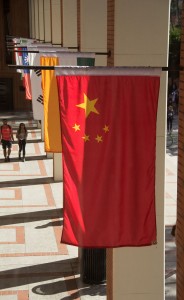Graduate students still seek US schools, new report says
A report released by the Council of Graduate Schools on Nov. 12 shows that the United States continues to be a popular destination for international graduate students. USC’s population of international students reflects this trend as the university remains a top choice for students from abroad.

On the rise · Last year, USC received 10,600 applications for graduate study from Chinese international students, accounting for 25% of the total. – Mariya Dondonyan | Daily Trojan
The data shows higher numbers of international graduate students despite the increase in competition that has resulted from foreign nations developing graduate programs. Larger numbers of students from other countries have also made up for a decline in Chinese graduate students.
According to the report, the number of international students at U.S. graduate programs in the past five years has risen from 7 to 10 percent; in addition, the total international graduate enrollment increased by 8 percent between fall 2013 and fall 2014, which means that approximately 17 percent of all graduate students in U.S. graduate programs are from other countries.
The new data indicates that India has surpassed China in number of graduate students sent to U.S. schools. This was the first time in over a decade that the number of Chinese students enrolling in U.S. graduate programs decreased by a total of 1 percent.
Though the 1 percent decrease in the number of Chinese graduate student enrollment might seem marginal, the number is significant, as students from China make up 33 percent of the total number of international students enrolling in U.S. graduate programs.
Over the past few years, China has made a conscious effort to improve the standards of its own graduate schools, which has given many Chinese students an opportunity to receive a high-quality education from programs offered domestically. Though nationally U.S. graduate schools are experiencing the decline in applicants from China, USC has actually received an increase in applications from Chinese students.
“Last year, USC received a record number of graduate applications,” USC Dean of Admissions Timothy Brunold said in an email to the Daily Trojan. “International applications made up 52 percent of last year’s total graduate application pool.”
This news comes after a report released on Sunday showed that USC is now the number two destination for students from abroad, behind New York University, after 13 years of having the highest international student enrollment of any U.S. university.
USC received a total of 10,600 graduate applications from Chinese international students, making up 48 percent of the university’s international graduate applications and 25 percent of its total graduate applications.
Data for this year is not yet available. It remains to be seen what role safety concerns may play in international student interest following the killings of three Chinese international graduate students at USC in the past two years.
The steady increase in international students annually by USC, specifically international students from China, can be attributed to a variety of things including extensive recruitment programs, well-regarded graduate academic programs and the university’s reputation for being home to a large international student body.
USC has also taken many measures aimed at continuing to attract international students to its campuses, including being receptive to international student issues.
This year, Vice President of Graduate Student Government Joanie Evans established the International Student Concerns Committee. Evans decided to start the committee in response to recent concerns over the safety of international students on campus.
“We are trying to figure out what factors led to students not knowing how to navigate the neighborhood [around USC’s campus] safely,” Evans said.
Some of the measures the committee and Graduate Student Government has taken include events and programs to help integrate international graduate students into the campus community. Evans and her committee also met with the creator of the new Trojan Mobile Safety app to voice specific concerns held by international students.
“The students there had an opportunity to preview the app, offer him feedback — so he got direct feedback from international students about ways to improve the app to make it better,” Evans said.
Though it is too early to project the international graduate application numbers for the coming academic year, Brunold expects more increases.
“Every indication is that we are on our way to another record year,” he wrote in an email.


Putting aside headcounts, being an international student isn’t easy, given our complex culture and language. Assistance must come from numerous sources to aid these young people embarking on life’s journey. A new award-winning worldwide book/ebook that helps anyone coming to the US is “What Foreigners Need To Know About America From A To Z: How to Understand Crazy American Culture, People, Government, Business, Language and More.” It is used in foreign Fulbright student programs and endorsed worldwide by ambassadors, educators, and editors. It also identifies “foreigners” who became successful in the US and how they contributed to our society, including students.
A chapter on education explains how to be accepted to an American university and cope with a confusing new culture, friendship process and daunting classroom differences. Some stay after graduation. It has chapters that explain how US businesses operate and how to get a job (which differs from most countries), a must for those who want to work for an American firm here or overseas.
It also has chapters that identify the most common English grammar and speech problems foreigners have and tips for easily overcoming them, the number one stumbling block they say they have to succeeding here.
Most struggle in their efforts and need guidance from schools’ international departments, immigration protection, host families, concerned neighbors and fellow
students, and books like this to extend a cultural helping hand so we all have a win-win situation. Good luck to all wherever you study!